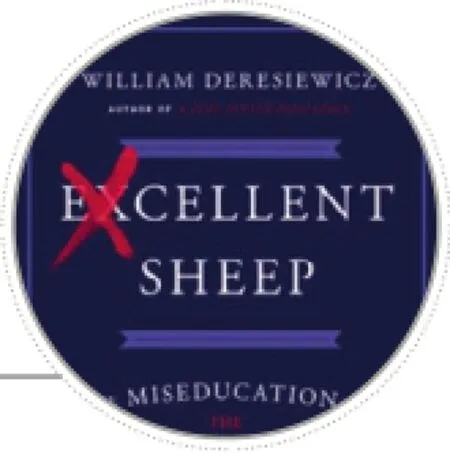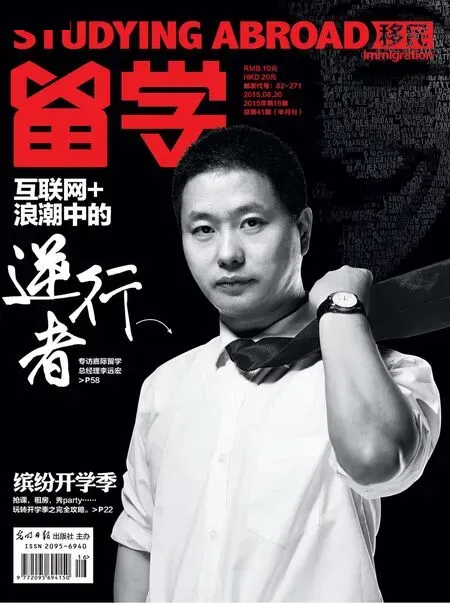优秀的绵羊
编译_黄立旖(实习记者)
优秀的绵羊
编译_黄立旖(实习记者)

八月初,一篇标题为《精致的利己主义者和常青藤的绵羊》的文章被疯狂转载,原始文章阅读量迅速突破两百万。作者在文中将《优秀的绵羊》中的美式教育批判和中式教育批判做了一个平行对比,到底是换汤不换药还是旧杯装新茶,读者不妨自行做评判。
This book, in many ways, is a letter to my twenty-year-old self. It talks about the kinds of things I wish that someone had encouraged me to think about when I was going to college—such as what the point of college might be in the first place.
这本书,写给二十岁的我自己。它包含了许多值得思考的话题,早在我快要上大学的时候,我就希望有人能这样鼓励我思考。
I was like so many kids today (and so many kids back then). I went off to college like a sleepwalker, like a zombie. College was a blank. College was the“next thing.” You went to college, you studied something, and afterward you went on to the next next thing, most probably some kind of graduate school.
我和现在的大多数孩子一样,行尸走肉般地选择了上大学这条路。大学对我来说是个未知数,它只是理所当然的“下一站”。考大学,学点东西,然后再按部就班去读研。
Up ahead were vaguely understood objectives: status, wealth, getting to the top—in a word, “success.” As for where you went to school, that was all about bragging rights, so of course you chose the most prestigious place that let you in. What it meant to actually get an education, and why you might want one—how it could help you acquire a self, or develop an independent mind, or find your way in the world—all this was off the table. Like kids today, I was processed through a system everyone around me simply took for granted.
有一些目标在牵引着迷糊的我:地位、财富、削尖脑袋挤进上流社会。总的来说,就是要取得成功。选择大学就是选择可以吹嘘的资本,所以你理所当然,会在录取你的学校中选择一所最有名的大学。至于接受高等教育的意义,为什么你要接受这种教育,它会如何开发自我,培养独立的思维,或者教你在这个世界上立足,这统统不是你会考虑的重点。就像现在的孩子一样,我和周围的人都把读大学当成想当然的事情。
I started college in 1981. The system, then, was in its early days, but it was already, unmistakably, a system, a set of tightly interlocking parts. When I speak in this book of elite education, I mean prestigious institutions like Harvard or Stanford or Williams as well as the larger universe of second-tier selective schools, but I also mean everything that leads up to and away from them: the private and affluent public high schools; the ever-growing industry of tutors and consultants, test-prep courses and enrichment programs; the admissions process itself, squatting like a dragon at the entrance to adulthood; the brandname graduate schools and employment opportunities that come after the BA; and the parents and communities, largely upper middle class, who push their children into the maw of this machine. In short, our entire system of elite education.
我1981年读的大学。高等教育体系在那时候还处于起步阶段,但毫无疑问,它已经开始成形。我在这本书谈的精英教育指的是一些名校,比如哈佛、斯坦福,或是威廉姆斯学院,还有更多二线的重点学校,但同时它也指通往大学的必由之路:私立的和优质的公立高中;日益增长的咨询顾问产业,应试培训班和提升项目;大学申请过程本身就如同一条守在成人世界大门的龙;本科毕业后大学自带的名牌效应和就业岗位;把他们孩子推进高等教育机器口中的那些绝大部分来自中上层阶级的父母。简单来说,我们整个体系都是为精英设计的。
What that system does to kids and how they can escape from it, what it does to our society and how we can dismantle it—those are the subjects of this book. I was teaching a class at Yale on the literature of friendship. One day we got around to talking about the importance of being alone. The ability to engage in introspection, I suggested, is the essential precondition for living the life of the mind, and the essential precondition for introspection is solitude. My students took this in for a second—introspection, solitude, the life of the mind, things they probably had not been asked to think about before—then one of them said, with a dawning sense of self-awareness, “So are you saying that we’re all just, like, really excellent sheep?”
这样的体系会怎样影响孩子,这些孩子又该怎样逃离体系的限制,这种体系对我们社会有什么影响,我们的社会又该如何解除这种影响—这是我将在书里讨论的主题。我曾在耶鲁教授《文学中的友谊》。有一天我们讨论独处的重要性。我认为,自省能力是成为一个有思想的人的前提,而孤独是开始自省的前提。我的学生花了一些时间,来消化我的想法,自省,孤独,精神,他们从未思索过这些主题。有一名学生开始领悟:“所以,你的意思是说,我们所有人只是像一群优秀的绵羊?”
All? Surely not. But after twentyfour years in the Ivy League—college at Columbia; a PhD at the same institution, including five years as a graduate instructor; and ten years, altogether, on the faculty at Yale—that was more or less how I had come to feel about it. The system manufactures students who are smart and talented and driven, yes, but also anxious, timid, and lost, with little intellectual curiosity and a stunted sense of purpose: trapped in a bubble of privilege, heading meekly in the same direction, great at what they’re doing but with no idea why they’re doing it. In 2008, on my way out the door, I published an essay that sketched out a few of these criticisms. Titled “The Disadvantages of an Elite Education,” the article appeared in the American Scholar, a small literary quarterly. At best, I thought, it might get a few thousand readers.
所有人?当然不是。但是在从藤校之一的哥伦比亚大学的学院毕业24年以后,在这里拿到了博士学位以后,其中的五年是研究生辅导员;在耶鲁工作了十年后—我多多少少开始觉得,这个体系在批量生产着机智而有天赋的学生,但同时,他们焦虑,胆怯又迷茫,几乎没有学术方面的好奇心,行事不果决,只是被裹在被优越感包装着的泡沫里逆来顺受,闷头苍蝇似的往一个方面赶,他们都知道自己在做什么,都做得很好,可是他们不知道这样做的理由。2008年,我发表了一篇文章,稍稍批评了这个现象。文章名字叫做《精英教育的弊端》,这篇文章在《美国学术》刊物上发表了,这是一个小学术季刊。我预测,会读这篇文章的顶多只有几千人。
Instead, it started to go viral almost from the moment it came out. Within a few weeks, the piece had been viewed a hundred thousand times (with many times that number in the months and years to come). Apparently I’d touched a nerve. These were not just the grumblings of an ex-professor. As it turned out from the many emails I began to get, the vast majority from current students and recent graduates, I had evoked a widespread discontent among today’s young high achievers—a sense that the system was cheating them out of a meaningful education, instilling them with values they rejected but couldn’t somehow get beyond.
然而,在发表之后,这篇文章被广泛传阅。几个星期之内,阅读量就达到几十万次。显然我触到了大家的敏感神经。这些话不只是我的怨言,从我收到的邮件里,我发现,大多数人都是在读的或是刚毕业的学生,我引发了精英人群广泛的不满—这种感觉就像是这个很有意义的教育体制欺骗了他们,给他们灌输自己反对但却无法推翻的价值。

